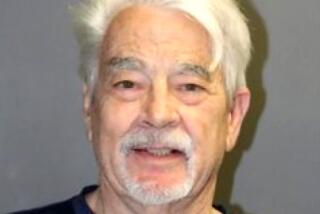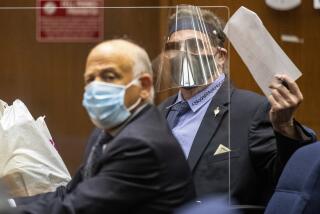Former USC gynecologist ordered to stand trial on sexual assault charges

- Share via
George Tyndall, the onetime University of Southern California campus gynecologist accused of preying on a generation of female students, will stand trial on sex crimes charges related to 16 former patients, a judge ruled Friday.
Los Angeles Superior Court Judge Larry Paul Fidler said prosecutors presented enough evidence in a series of hearings for Tyndall, 76, to face a jury.
That trial is expected to take place next year.
Tyndall, who practiced at the campus health clinic for three decades, is charged with 27 felonies — 18 counts of sexual penetration of an unconscious person and nine counts of sexual battery by fraud. The alleged crimes occurred between 2009 and 2016.
Prosecutors initially filed charges in 2019 related to 21 former patients, but had to drop counts related to five women. “We were unable to make contact with one victim … and four victims advised us that they were opting out of the case,” said Deputy Dist. Atty. Reinhold Mueller, the lead prosecutor, in an email.
Dr. George Tyndall arrived on the USC campus in the summer of 1989.
Tyndall’s lawyer Leonard Levine said his client is “looking forward to” the trial.
“He believes he will be exonerated after a fair trial, which he expects to get,” Levine said.
The Times revealed in 2018 that Tyndall had been the subject of numerous complaints from staff and patients during his 27 years at the clinic. They reported that he was photographing patients’ genitals, touching women inappropriately during pelvic exams and other “creepy” behavior.
Hundreds of women subsequently sued USC and the university eventually paid out settlements totalling $1.1 billion — the largest payout in higher education history — to thousands of former patients.
Some of these women testified in pretrial hearings in Tyndall’s criminal case. One former patient, identified only as Jane Doe no. 21, flew in from New York to testify in May 2022.
She recounted an August 2013 appointment at the campus health center that was prompted by her concern about a spot near her genitals. While she lay on her back, she recalled, Tyndall visually examined her and told her that he believed she had syphilis. Then, she testified, she felt him putting fingers inside her.
“Did he tell you he was going to insert his fingers into you?” asked a prosecutor.
“No,” she replied, adding that she was “scared” and “very panicked” because she believed she had syphilis. For the next five to 10 minutes, she recalled, he moved his fingers around inside her, applying “pushing, consistent pressure” in a “forward and backward motion.”
Tyndall, she said, commented on the tightness of her vagina and repeatedly asked if she was sure she was not a virgin “because I was so tight.”
“It wasn’t something I ever experienced in a medical setting, or after,” she said, with him “asking me multiple times, are you sure you’re not a virgin?”
“At the end of the examination, he told me I had a beautiful vagina,” she testified. “I thought it was a weird comment to make but I brushed it off.”
She did not remember there being a chaperone or medical assistant present for the exam. She was never diagnosed with syphilis. After changing the type of underwear she wore, the dry skin went away.
Like others in the case, she said she did not come forward until after The Times’ investigation in 2018, when she eventually reached an attorney and talked to the Los Angeles Police Department.
Levine said the accounts of Jane Doe 21 and other victims supported the defense’s contention that the newspaper’s coverage led women to file complaints about exams that they had not previously considered criminal in nature.
“We got a chronology that we’ve always believed was accurate and that is that no one ever complained about alleged sexual assault or any criminal conduct until after the article appeared in the L.A. Times,” Levine said.
Tyndall’s arraignment is scheduled for Aug. 25.
More to Read
Sign up for Essential California
The most important California stories and recommendations in your inbox every morning.
You may occasionally receive promotional content from the Los Angeles Times.











